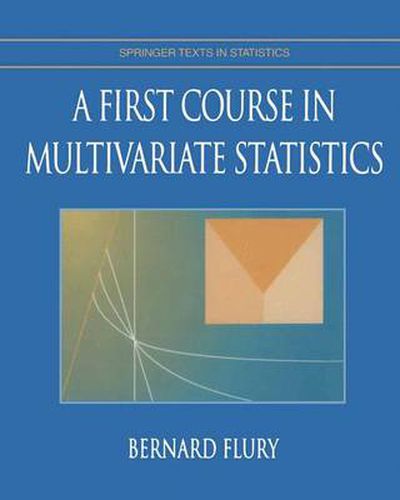Readings Newsletter
Become a Readings Member to make your shopping experience even easier.
Sign in or sign up for free!
You’re not far away from qualifying for FREE standard shipping within Australia
You’ve qualified for FREE standard shipping within Australia
The cart is loading…






This is author-approved bcc: Multivariate statistical methods have evolved from the pioneering work of Fisher, Pearson, Hotelling,and others, motivated by practical problems in biological and other sciences. In the past fifty years the field has grown rapidly, largely due to the availability of computers that make the calculations feasible. This book gives a comprehensive and self-contained introduction, carefully balancing mathematical theory and practical applications. A First Course in Multivariate Statistics starts at an elementary level, developing concepts of multivariate distributions from first principles. A chapter on the multivariate normal distribution reviews the classical parametric theory. Methods of estimation are explored using the plug-in principles as well as maximum likelihood. Two chapters on discrimination and classification, including logistic regression, are at the core of the book. Methods of testing hypotheses are developed from heuristic principles, followed by likelihood ratio tests and permutation tests. The powerful self- consistency principle is used to introduce principal components as a method of approximation. The book concludes with a chapter on finite mixture analysis, a topic of great practical and theoretical importance. Unique features of A First Course in Multivariate Statistics include the presentation of the EM algorithm for maximum likelihood estimation with incomplete data, resampling based methods of testing, a brief introduction to the theory of elliptical distributions, and a comparison of linear and quadratic classification rules. Examples from biology, anthropology, chemistry, and other area are worked out
$9.00 standard shipping within Australia
FREE standard shipping within Australia for orders over $100.00
Express & International shipping calculated at checkout
This is author-approved bcc: Multivariate statistical methods have evolved from the pioneering work of Fisher, Pearson, Hotelling,and others, motivated by practical problems in biological and other sciences. In the past fifty years the field has grown rapidly, largely due to the availability of computers that make the calculations feasible. This book gives a comprehensive and self-contained introduction, carefully balancing mathematical theory and practical applications. A First Course in Multivariate Statistics starts at an elementary level, developing concepts of multivariate distributions from first principles. A chapter on the multivariate normal distribution reviews the classical parametric theory. Methods of estimation are explored using the plug-in principles as well as maximum likelihood. Two chapters on discrimination and classification, including logistic regression, are at the core of the book. Methods of testing hypotheses are developed from heuristic principles, followed by likelihood ratio tests and permutation tests. The powerful self- consistency principle is used to introduce principal components as a method of approximation. The book concludes with a chapter on finite mixture analysis, a topic of great practical and theoretical importance. Unique features of A First Course in Multivariate Statistics include the presentation of the EM algorithm for maximum likelihood estimation with incomplete data, resampling based methods of testing, a brief introduction to the theory of elliptical distributions, and a comparison of linear and quadratic classification rules. Examples from biology, anthropology, chemistry, and other area are worked out